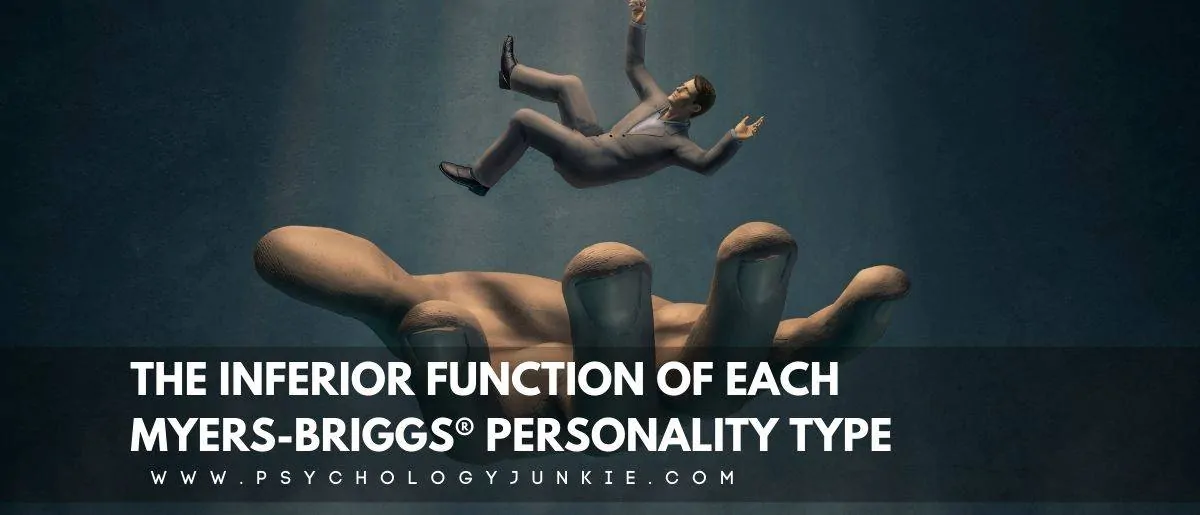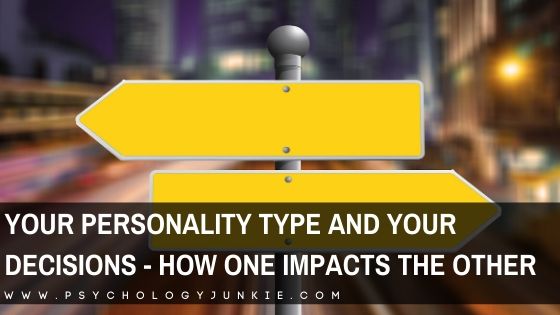The Inferior Function of Each Myers-Briggs® Personality Type
Is there a certain part of your life that feels nearly impossible to master? Do you feel like the same experiences trip you up again and again? Your Myers-Briggs® personality type might have something to do with that! Each of us is wired to perform well in certain areas but at the expense of other areas of expertise. Dominant intuitives might have world-changing insights and ideas but constantly lose their keys or forget the driving directions to a place they go regularly. Dominant thinking types might know how to troubleshoot in the most chaotic situations, but then inadvertently offend people without meaning to.
Your inferior function is in many ways like the Achilles’ heel of your personality type. It’s a mental process that you wish you could use proficiently, but it keeps tripping you up (sometimes quite literally). There are moments in your life when you channel it with proficiency, but it’s never dependable. You often find this function to be a waste of time, or of less merit than your dominant function. You know you can’t use it well, so in some ways your mind shrugs it off as if to say, “Well, it’s not that important.”

With that in mind, let’s take a look at the inferior functions of each of the 16 personality types in the Myers-Briggs® system.
Not sure what your personality type is? Take our new personality questionnaire here. Or you can take the official MBTI® here.
This post is part of a series! See the other segments below:
The Dominant Function of Every Myers-Briggs® Personality Type
The Auxiliary Function of Every Myers-Briggs® Personality Type
The Tertiary Function of Every Myers-Briggs® Personality Type
The Inferior Function of Each Myers-Briggs® Personality Type
ENFPs and ENTPs – Inferior Introverted Sensation (Si)
“Introverted sensing (or Si for short) focuses on the inner, subjective world of personal experience and impressions. It is highly aware of details, both in the environment and inside the body. Introverted sensors are frequently comparing and contrasting past to present, noticing differences and changing patterns. They are often the first to notice when something in a room has changed or when someone’s behavior seems inconsistent. They are also highly aware of inner body sensations such as hunger, thirst, or fatigue.” – Susan Storm, Introduction to Cognitive Functions
As an ENP, you are an innovator who lives in a world of possibilities, ideas, and aspirations. In your eagerness to generate new possibilities, however, you can lose sight of existing solutions, details, and physical needs. For example, you might frequently forget to eat, take certain medications, or file your taxes on time. Performing simple everyday tasks can feel like an enormous burden to you because it forces you to step out of your dominant function (Extraverted Intuition) and into your inferior function (Introverted Sensation). Paying attention to minute details, repeating processes, and tuning into your physical needs can feel boring and under-stimulating because you crave a sense of novelty, adventure, and exploration.
Your inferior function may also show up in judgments you make about others. Types who have powerful Introverted Sensation (SJ types) may seem dull, stuck in their ways, or nitpicky to you. You may struggle to find similar topics to discuss because you are naturally focused on exploring theories, possibilities, and concepts and they are more interested in discussing real-life details and experiences.
It’s important to remember that tapping into your inferior function for short periods of time is useful and healthy. You can find ways to do that in our article: How to Improve Your Weaknesses, Based On Your Personality Type.
How Inferior Introverted Sensation Shows Up During Stress:
During extreme or chronic stress, you may wear out your normal ways of thinking. When this happens, you experience a “grip episode.” During these episodes, your inferior function takes over and tries to run your life. You might suddenly become obsessed with minutiae, nitty-gritty details, and past experiences and memories. You might also become hyper-focused on the sensations you feel inside your body, becoming worried that small discomforts are a sign of a more serious problem. You can find out more about this in our article about stress and the personality types.
INFPs and ISFPs – Inferior Extraverted Thinking (Te)
“Extraverted Thinking (or Te for short) is a decision-making process that focuses on using logical binary judgments to organize, evaluate, and assign information in the outer world. Te seeks to structure the outer world and sort everything into its proper place using logical systems and rules. Te may seem detached from people, but it actually uses objective logic and structure to take care of people and make life more efficient for everyone.” – Susan Storm, Introduction to Cognitive Functions
As an IxFP you’re someone who strives to live in alignment with your deeply-held values. You think about what’s right or wrong, how choices will impact people, and you search for emotional resonance and meaning. Because you have inferior Extraverted Thinking, you are less concerned with making your life efficient, structured, and organized. Focusing on the impersonal logic and effectiveness of things tends to feel dull and monotonous to you. You may have a difficult time organizing tasks so that they can get done in a timely manner. You may also struggle when you have to critique someone’s work or make a strategic decision. While you like having a sense of control and order in your life, it can feel overwhelming and boring to focus on such things because it forces you out of your dominant function (Introverted Feeling) and into your inferior function (Extraverted Thinking).
Your inferior function may show up in judgments you make about other personality types as well. You might see types who have powerful Extraverted Thinking (TJ types) as overbearing, hasty, or rigid. You might feel like they are only seeing “one side of the coin” while they are thinking the exact same thing about you! You may struggle if you have to make decisions alongside a TJ personality type because you’ll both be looking at completely different criteria.
How Inferior Extraverted Thinking Shows Up During Stress:
During cases of extreme or chronic stress, you may wear out your typical ways of thinking. When this happens, you can experience a “grip episode.” During these times, Extraverted Thinking will take control of your personality because your feeling side is too depleted. When this happens, you become uncharacteristically focused on accomplishment, rewards, and task completion. You can become more critical, harsh, and direct. Rather than focusing on your values or the emotional needs of others, you fixate on efficiency and can become impatient and hasty in your judgments. You can find out more about this in our article about stress and the personality types.
INTPs and ISTPs – Inferior Extraverted Feeling (Fe)
“Extraverted Feeling (Fe) is a decision-making function that focuses on making choices or taking action to create harmony in the environment. It takes into account cultural value systems, social standards, and the effects every decision has on other people. It is actively concerned for the welfare of others, to the extent that the Fe-user will put their own needs and desires last in order to create harmony for people outside themselves. Outer harmony for others equals inner harmony for the Fe user in many cases.”- Susan Storm, Introduction to Cognitive Functions
As an IxTP you enjoy understanding systems, theories, and how things work. You have a gift for troubleshooting, categorizing, and organizing logical principles in your mind. Whether you’re taking apart a car engine to understand its mechanisms or learning a new art form, understanding how things fit together is essential to you. Of less concern is how people are feeling, what’s socially acceptable, and whether or not the atmosphere around you is harmonious. When you have to go to social events and “work the room” you may feel out of your depth and uncomfortable. When people around you are emotionally charged, you probably feel like the right words are evading you. You may wish that people were more like car engines, easy to understand – with each facet connecting easily to another. Having to delve into someone else’s emotional experience can feel overwhelming and awkward to you. That’s because this forces you out of your dominant function (Introverted Thinking) and into your inferior function (Extraverted Feeling).
Your inferior function may show up in relationship issues that arise as well. When you’re dealing with people with powerful Extraverted Feeling (FJ types) you might feel that they are people-pleasing, illogical, or overly concerned with social expectations. If you have to come to an agreement with an FJ type, you both will be coming from different angles. They might feel like you’re only focusing on what’s logical for you without taking other people’s needs into account. You, in turn, might feel that they are focusing too much on what other people need and not enough on what’s logical for themselves.
It’s important to remember that tapping into your inferior function for short periods of time is useful and healthy. You can find ways to do that in our article: How to Improve Your Weaknesses, Based On Your Personality Type.
How Inferior Extraverted Feeling Shows Up During Stress:
During periods of extreme or chronic stress, your inferior function might “take the wheel” of your personality type. You may become uncharacteristically focused on how other people are responding to you. You might crave affirmation and harmonious interactions and look for ways to get positive feedback. You might find yourself being strongly affected by the moods of others and feeling less grounded in your reasoning and logic. This tends to be extremely uncomfortable and confusing for you because, during these phases, your normal way of thinking seems distant and inaccessible. You can find out more about this in our article about stress and the personality types.
ENFJs and ESFJs – Inferior Introverted Thinking (Ti)
“The Ti-user has a grid-like system of categories in their mind that they are constantly expanding on and revising. Whenever they get new information they add it to that framework or revise their entire framework to make room for new data. They only accept truths they have analyzed and evaluated and held up to intense scrutiny. Like a camera that keeps zooming in and refining its focus, the introverted thinker goes through cycles of thinking, each time getting more precise, more accurate, and in the end finding the most precise category to fit that data into.” – Susan Storm, Introduction to Cognitive Functions
As an ExFJ you are innately aware of the emotional and physical needs of the people around you. You naturally make decisions by prioritizing the needs of people, considering how they will be affected, and the emotional impact they will experience. In contrast, dealing with impersonal facts and principles can be boring or frustrating for you. You might feel vulnerable or of poor confidence when you have to reason something out loud or troubleshoot a complicated, impersonal problem. Debating, critiquing, or evaluating impersonal information can feel pointless or boring to you because it’s pulling you out of your dominant function (Extraverted Feeling) and into your inferior function (Introverted Thinking).
Your inferior function can also show up in your relationships with other personality types. You might clash with people who have powerful Introverted Thinking (TP types) because you come from very different perspectives when you make decisions. While you prioritize the feelings of people and your values, they prioritize consistency with their logical principles. You might feel like they are being needlessly difficult or putting themselves above the needs of the group. In return, they may feel that you’re being too people-pleasing or illogical.
It’s important to remember that tapping into your inferior function for short periods of time is useful and healthy. You can find ways to do that in our article: How to Improve Your Weaknesses, Based On Your Personality Type.
How Inferior Introverted Thinking Shows Up During Stress:
During periods of extreme or chronic stress, you might fall “into the grip” of your inferior function. This happens because you have worn out your dominant or auxiliary functions and the inferior rises up to the surface. When this happens, you become uncharacteristically critical, detached, and withdrawn. You become fixated on finding truth, understanding how something works, and being unaffected by others so you can think clearly. You can find out more about this in our article about stress and the personality types.
ENTJs and ESTJs – Inferior Introverted Feeling (Fi)
“Introverted Feeling (or Fi for short) is a decision-making function that focuses on the internal, subjective world of values and personal ethics. Fi seeks individuality, authenticity, and personal meaning. It wants to act and make choices that promote inner harmony and tranquility. It holds non-negotiable core values and while it’s open-minded to other people’s lifestyles and choices, it won’t tolerate violation of its own core values and beliefs.” – Susan Storm, Introduction to Cognitive Functions
As an ExTJ, you consider yourself a “doer” more than a dreamer. You enjoy organizing your life for efficiency and effectiveness. You can easily condense any problem or decision down to a yes or no answer, and you easily sense the logical cause and effects of various options. Because of this, you can become so fixated on doing and achieving that you lose sight of your core values and personal needs. You might struggle with workaholism or become brash in your decisions – choosing what’s logical over what aligns with your values or the values of others. Dwelling on your feelings about things can feel like a waste of time because it’s not accomplishing anything on your to-do list.
Your inferior function can also show up in your relationships and friendships with other personality types. You might struggle to come to agreements with Feeling-Perceiving personality types because you’re both looking at the opposite side of the coin in decisions. You may see them as overly sensitive, unproductive, or too fixated on their feelings. Likewise, they may find you insensitive, pushy, or out of touch with your feelings. The truth is that both of you have an equally valuable perspective to bring to the situation so if you can respect it and learn from each other your decisions can be much more effective in the long run.
It’s important to remember that tapping into your inferior function for short periods of time is useful and healthy. You can find ways to do that in our article: How to Improve Your Weaknesses, Based On Your Personality Type.
How Inferior Introverted Feeling Shows Up During Stress:
During cases of extreme or chronic stress, you may experience a “grip episode.” During these episodes, your inferior function takes over your personality and you lose touch with your normal way of thinking. Decisions become harder and you become more wrapped up in your feelings. You may isolate yourself, become more introspective, and feel especially alone and without help from others. You can find out more about this in our article about stress and the personality types.
INFJs and INTJs – Inferior Extraverted Sensation (Se)
“Extraverted sensing (or Se for short) is an information-gathering process that focuses on the current world in all its objective, literal reality. Se gets energy and enjoyment from directly interacting with the outside world (people, objects, nature, events). This is the cognitive function most tuned into the present moment and the only cognitive function that gathers pure, unfiltered sensory information without making associations from past or future.” – Susan Storm, Introduction to Cognitive Functions
As an INxJ you easily sense the ripple-effects of current actions and experiences. Where certain types focus more on the present (SPs for example) you focus intensely on the future. You enjoy predicting, anticipating, and looking beneath the surface for patterns and possibilities. Because you are so fixated on the future, you tend to struggle when it comes to staying in the present. You may overlook details of your environment, or miss out on experiences that provide fun and enjoyment because you’re too busy thinking ahead. You may get so absorbed in looking for a deeper meaning behind something that you fail to see that the answer is right on the surface. Focusing on the details around you and looking at life in order to experience it in the present can make you feel bored and unfulfilled.
Your inferior function can also show up in your relationships with other personality types. You might clash with Sensing-Perceiving types because you want to anticipate distant future scenarios while they want to stay grounded in the present. You might perceive them as shallow, distractible, or blind to implications. In contrast, they might see you as removed, overly-serious, and blind to the present moment.
It’s important to remember that tapping into your inferior function for short periods of time is useful and healthy. You can find ways to do that in our article: How to Improve Your Weaknesses, Based On Your Personality Type.
How Inferior Extraverted Sensation Impacts You During Stress:
During periods of extreme or chronic stress, you may find yourself behaving differently than usual. When this happens, you may be in the grip of your inferior function. During inferior Sensation eruptions, you can become impulsive, reckless, and hedonistic. You might binge eat, drink, spend recklessly, or look for some high-sensory impulsive experience. Some INxJs find healthier outlets for their grip experiences – cleaning, exercising, or listening to loud music while driving. You can find out more about this in our article about stress and the personality types.
ISFJs and ISTJs – Inferior Extraverted Intuition (Ne)
“Extraverted Intuition (or Ne for short) is an information-gathering process that focuses on finding theoretical connections, relationships, and possibilities. It is stimulated by objects, people, and events in the environment and wants to generate real-world possibilities. The Ne-user easily grasps how everything can be transformed and views everything in the context of its associations with everything else. ‘Everything is connected and anything is possible’ to the extraverted intuitive.” – Susan Storm, Introduction to Cognitive Functions
As an ISxJ you are deeply in tune with the details of the world around you. You can quickly compare and contrast what’s happening now with a similar situation in the past. This means that you can recall solutions, memories, and impressions that connect with the current situation. You like life to be stable, routine, and calm. In contrast, extrapolating new possibilities and trying new things can make you nervous and uneasy. Dwelling on theories and concepts can be entertaining for a short amount of time, but then you want to snap back to reality and focus on what you trust and know through experience. You might be unsure of your potential or the potential of an idea that’s never been tried before. You may feel insecure in new environments that have nothing familiar about them.
Your inferior function can also impact the judgments you make about other personality types. You might prematurely judge Intuitive-Perceiving personality types as flighty, unrealistic, and out of touch with reality. In contrast, they may see you as stuck in your routine, overly-cautious, and narrow-minded. When you both realize that you are seeing two different sides to the same coin then you can begin to grow and appreciate each other’s perspectives.
It’s important to remember that tapping into your inferior function for short periods of time is useful and healthy. You can find ways to do that in our article: How to Improve Your Weaknesses, Based On Your Personality Type.
How Inferior Extraverted Intuition Can Show Up During Stress:
When you are experiencing extreme or chronic stress you might slip into the grip of your inferior function. When this happens you become uncharacteristically focused on future possibilities and tragedies. You might see nothing but negative possibilities lying ahead of you and you may catastrophize all the ways that something could go wrong. Unlike the ENxP, you don’t see positive potential everywhere – your premonitions and ideas tend to have a tinge of darkness and fear. You can find out more about this in our article about stress and the personality types.
ESTPs and ESFPs – Inferior Introverted Intuition (Ni)
“Introverted Intuition (or Ni for short) is an information-gathering process that focuses on the inner, subjective world of the unconscious to find connections and abstract relationships between the unconscious and the outer world. It is always searching for underlying meanings, symbols, and abstract connections. Ni is the only perceiving process that works independently of the conscious mind. It doesn’t rely on external stimulus, and in fact works better when withdrawn from external stimulation. It operates unpredictably, often through sudden “flashes” of insight or awareness into the meaning of things or a future outcome. It is always looking forward and is less concerned with the present moment unless it relates to a future outcome.” – Susan Storm, Introduction to Cognitive Functions
As an ESxP, you focus primarily on the present moment and all the experiences and opportunities available to you right now. You like to be active and immersed in everything life has to offer. You want to touch, taste, and enjoy life every minute of the day. “Seize the day!” would be your motto and you try to live life to the fullest. Because this is your nature, you tend to feel uncomfortable when you have to predict far into the future. Making guesses about your future and long-term commitments feels like a ridiculous gamble to you. What if you change your mind? What if your circumstances change? You tend to fixate on what you can do now rather than what you could do then.
Because you experience Introverted Intuition in an inferior sense, you can have difficulties understanding where Intuitive-Judging personality types are coming from. You might perceive them as unrealistic, out of touch, and removed. They, in turn, might see you as shallow, pleasure-seeking, and out-of-touch with the implications of your actions.
When you both realize that you are seeing two equally important perspectives in life, then you can learn from each other and respect each other.
It’s important to remember that tapping into your inferior function for short periods of time is useful and healthy. You can find ways to do that in our article: How to Improve Your Weaknesses, Based On Your Personality Type.
How Inferior Introverted Intuition Can Show Up During Stress:
During periods of intense or chronic stress, you might slip into the grip of your inferior function. When this happens, you become uncharacteristically gloomy and distant. Rather than enjoying what life has to offer you suddenly see nothing but a negative future ahead of you. You can see nothing but darkness and confusion and, as a result, you may detach from the activities you’d normally enjoy. You can find out more about this in our article about stress and the personality types.
What Are Your Thoughts?
Did you enjoy this article? Do you have any insights or perspectives to share? Let us know in the comments!
Find out more about your personality type in our eBooks, Discovering You: Unlocking the Power of Personality Type, The INFJ – Understanding the Mystic, The INFP – Understanding the Dreamer, and The INTJ – Understanding the Strategist. You can also connect with me via Facebook, Instagram, or Twitter!












